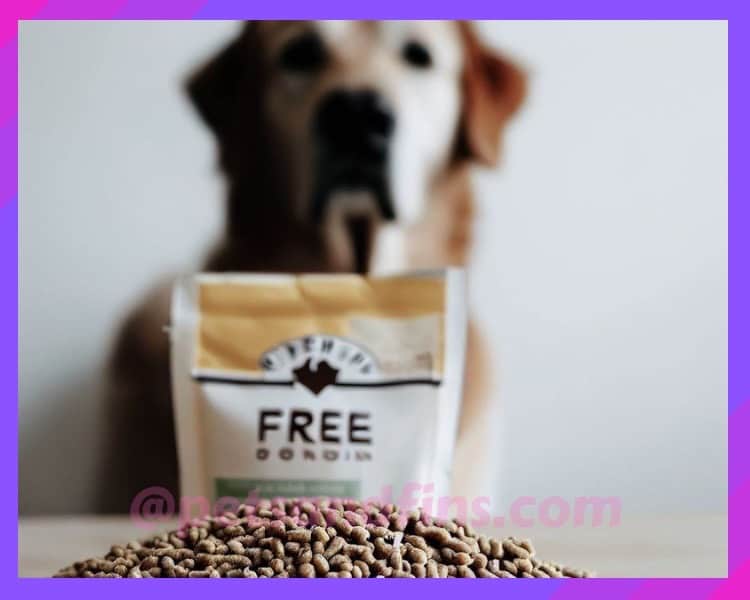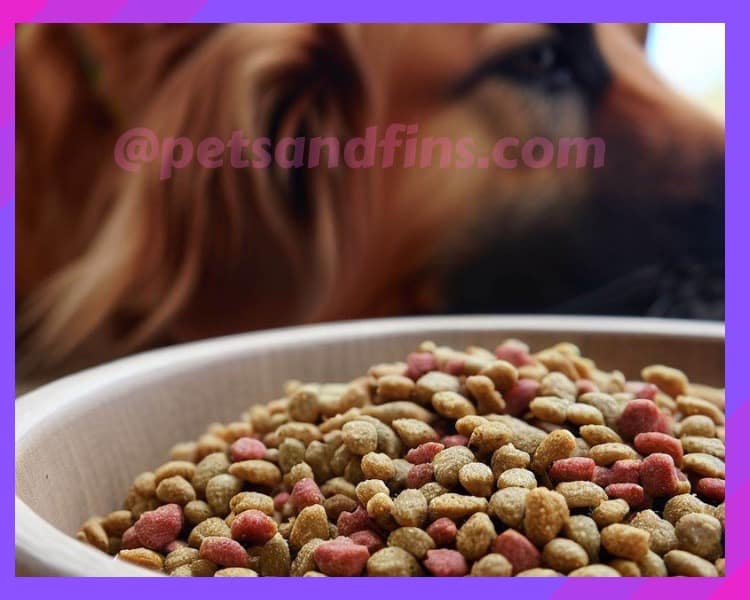Are you considering switching to grain-free dog food but unsure if it’s the best choice for your dog’s health?
Are you concerned about the potential dangers of grain-free dog food? Is grain-free dog food good for dogs?
Get the facts here before making any dietary changes for your dog.
As a devoted pet owner, I’ve always been intrigued by the debate surrounding grain-free dog food. With so much conflicting information out there, it can be challenging to discern what to believe.
After conducting my own research on the subject, I discovered that there is little scientific evidence to back up the alleged benefits of grain-free dog food. Let me explain in a little depth.
What Is Grain-free Dog Food?
Grain-free dog food is exactly what it sounds like – a type of dog food that does not contain any grains such as wheat, corn, or rice. Instead, it typically uses alternative sources of carbohydrates such as sweet potatoes or peas.
The concept behind opting for grain-free dog food is to provide a healthier and more natural diet for our furry friends.
Some pet owners believe that a grain-free diet is more natural for dogs since they are carnivores by nature and would not consume grains in the wild.

While this argument may be debated among experts, many pet owners feel more comfortable feeding their dogs a diet that they perceive as being closer to what their ancestors would have eaten.
There is a belief among some dog owners that grains may trigger allergies, digestive issues, or unwanted weight gain in dogs.
As a result, many dog owners have turned to grain-free brands for their pets. This shift has led to an increase in the number of brands offering these options—ranging from premium and organic to more affordable ones.
Let’s try find out more about the pros and cons of grain-free dog food.
What are The Main Benefits of Grain free dog food ?
Recently, more and more pet owners have been opting for grain-free dog food due to its perceived benefits for their furry friends.
Here are 7 potential advantages of grain-free dog food that have been reported by some pet owners:
1. Reduced Allergies: Grain-free dog food may be helpful for dogs with allergies or sensitivities to grains such as wheat, corn, and soy. These ingredients are common allergens and eliminating them from the diet may alleviate allergic reactions.
Symptoms of grain allergies can include skin irritation, digestive issues, and ear infections. By eliminating grains from their diet, these dogs may experience relief from these symptoms.
2. Improved Digestion: Dogs are carnivores, and their digestive systems are not equipped to handle large amounts of grains. Grain-free dog food can be easier for dogs to digest and may result in fewer gastrointestinal problems.
3. Increased Energy: Grain-free dog food usually contains high-quality protein sources like meat which can provide sustained energy to dogs throughout the day.
4. Better Coat and Skin: Some pet owners have observed an improvement in their dogs’ coats and skin after switching to grain-free dog food, possibly due to the nutrient-dense ingredients found in many grain-free formulas.
5. Healthier Weight: Many grain-free dog foods contain low carbohydrates but high protein content which can help maintain a healthy weight in dogs while promoting muscle growth.
6. Improved Dental Health: Some grain-free dog foods contain ingredients like sweet potatoes that promote dental health by cleaning teeth and freshening breaths.
7. Fewer Preservatives: Grain-free dog foods often include fewer preservatives and artificial additives than traditional ones, which can benefit dogs with sensitivities or allergies to these substances.
While there is no scientific evidence supporting these claims yet, it’s important to note that before making any changes in your furry friend’s diet, consulting a veterinarian is always recommended.
Pro Tip :It is important to note that not all dogs require a grain-free diet. Dogs who do not have any allergies or digestive issues may do just fine on a diet that includes grains.

What Are The health concerns Of grain free dog food ?
Grain-free dog food has become increasingly popular among pet owners who believe it to be a healthier option for their furry friends.
However, there are several health concerns associated with this type of diet. Here are seven major issues to consider:
1. Nutritional imbalances: Grain-free dog foods often replace grains with other ingredients that may not provide the necessary balance of nutrients, leading to nutritional imbalances in your dog’s diet.
2. Increased risk of heart disease: Many grain-free dog foods contain high levels of peas, lentils, and other legumes as a substitute for grains. These ingredients have been linked to an increased risk of heart disease in dogs.
3. Digestive issues: Some dogs may experience digestive problems such as diarrhea and constipation due to the high protein content found in grain-free dog foods.
4. Dental problems: Carbohydrates found in many grain-free dog foods can contribute to dental issues like plaque and tartar buildup.
5. Allergies: While some dogs may have grain allergies, most dogs can digest grains without issue. However, grain-free dog food may contain other ingredients that could trigger allergies in some dogs.
6. Cost: Grain-free dog food is typically more expensive than traditional options, which can be a financial burden for pet owners.
7. Lack of scientific evidence: Despite its popularity, there is limited scientific evidence supporting the supposed health benefits of grain-free dog food; many claims made by manufacturers are based on marketing rather than research.
Consulting with your veterinarian is always recommended when determining the best diet for your individual furry friend’s needs and well-being.

FDA and grain free dog food Controversy
In fact, the FDA has even expressed concerns about the possible dangers associated with these types of diets. A grain-free dog food warning was issued by the FDA.So where does all this controversy come from?
In recent years there have been concerns about a potential connection between grain-free diets and dilated cardiomyopathy (DCM), a type of heart disease.
DCM is an acute condition that can cause heart failure or death in severe cases. Although its exact cause isn’t fully understood yet certain nutritional deficiencies may play a role.
In 2018, the FDA released advisory cautioning pet owners and veterinarians about the possible link between grain-free diets and DCM.
Check out the full details here 👉🏻👉🏻FDA Investigation into Potential Link between Certain Diets and Canine Dilated Cardiomyopathy
Following their investigation into the matter, they found out many dogs diagnosed with DCM were being fed high legume (such as peas or lentils) or potato-rich grain-free diets.
While it remains unclear how these ingredients contribute to DCM exactly but FDA recommends feeding your dog balanced diets containing grains while avoiding high legumes or potatoes-rich meals.
It’s important to note that the FDA’s findings are not conclusive and that more research is necessary to fully comprehend the potential risks and benefits of different dog diets.
Nevertheless, it’s evident that there is currently little scientific evidence supporting grain-free diets’ alleged advantages while carrying potential risks.
Key Takeaways
If you opt for a grain-free diet for your dog, make sure that it is nutritionally complete and balanced. Try to research adequately on the best grain-free dog food available in the market.
Look for brands that have been developed by veterinary nutritionists and have undergone feeding trials to meet AAFCO (Association of American Feed Control Officials) standards for complete and balanced nutrition.
The recent controversy surrounding grain-free dog food emphasizes the significance of conducting proper research and consulting with your veterinarian about your dog’s individual nutritional needs.
Although there may be some potential benefits to grain-free diets, there is currently limited scientific evidence to support these claims while also carrying potential risks associated with these types of diets.
By collaborating with your veterinarian and selecting high-quality, nutritionally complete dog food brands, you can ensure that your furry companion receives the essential nutrients they require to maintain optimal health and happiness.
Wrapping Up
Ultimately, whether or not you choose to feed your dog a grain-free diet will depend on your individual pup’s needs and preferences as well as your own beliefs about what constitutes an ideal canine diet.
If you do decide to make the switch to grain-free kibble, be sure to do your research and choose a high-quality brand that meets all of your dog’s nutritional needs.
In conclusion, grain-free dog food is a popular trend among pet owners who are looking for a more natural and potentially healthier option for their furry friends.
While there are pros and cons to this type of diet, it may be worth considering if your dog has allergies or sensitivities to grains or if you simply want to provide them with a higher protein diet.
Do vets recommend grain-free dog food?

Unfortunately, the answer to this question is not straightforward. While some veterinarians may suggest a grain-free diet for certain dogs, there are many who are skeptical of the trend and do not readily recommend it to their clients.
The reason behind some vets recommending grain-free dog food maybe if the dog has an allergy or sensitivity towards grains.
In such cases, feeding them a grain-free diet could be necessary to relieve their symptoms and improve overall health.
However, it’s essential to note that most dogs do not have allergies or sensitivities towards grains. Also, there is no scientific evidence supporting the notion that a grain-free diet is better or healthier for dogs.
In fact, warnings have been issued by the FDA regarding potential risks associated with feeding dogs with grain-free diets. These include a possible link between certain types of grain-free diets and dilated cardiomyopathy (DCM), which is a heart condition.
Given these potential risks and the lack of scientific evidence supporting its benefits, many vets are hesitant to recommend grain-free dog food as a general rule.
Instead, they may suggest balanced diets that include both grains and other healthy ingredients.
To sum up, while some vets may advocate for grain-free dog food in specific cases, there isn’t any consensus among veterinary professionals on this issue. Therefore one must carefully consider potential risks before switching to a grain-free diet for their furry friends.
Is Grain free dog food good for dogs with allergies?

In recent years, the popularity of grain-free dog food has surged as many pet owners believe it can benefit dogs with allergies.
However, while some dogs may indeed have allergies to grains, the truth is that most dogs are not actually allergic to them, and in fact, grains can provide vital nutrients necessary for a balanced diet.
Grain-free dog food often substitutes grains with alternative ingredients like potatoes or peas. However, these ingredients can also be common allergens for some dogs.
Additionally, some grain-free dog foods may contain higher levels of protein and fat which may prove difficult for sensitive-stomached dogs to digest.
If your dog has been diagnosed with a grain allergy by your veterinarian, they might recommend a grain-free diet.
However, it’s important to note that food allergies in dogs are quite rare; instead, dogs might have intolerances or sensitivities to certain ingredients.
Should you suspect that your dog has a food allergy or intolerance of any kind whatsoever – it’s crucial you seek veterinary advice before making any dietary changes.
They will likely recommend a food trial to determine which specific ingredients your dog is reacting adversely too.
In many cases adding small amounts of grains into their diet could be the simple solution needed to provide necessary nutrients and reduce the risk of food allergies.
Your veterinarian can help you determine which grains and amounts are appropriate for your furry friend’s specific needs.
In conclusion: whilst grain-free dog food might benefit those diagnosed with grain allergies – it is neither necessary nor recommended for most pups out there!
Before making any dietary changes – always consult with your veterinarian first who will help determine the best course of action for your precious pup’s health and well-being!
How do I know if my dog needs a grain free diet?

While some dogs may benefit from such a diet, it is not necessary for all canines. So how do you know if your dog needs a grain-free diet? Here are some factors to consider:
1. Food Allergies: Certain dogs may be allergic to grains, which can cause skin irritation, ear infections, or gastrointestinal problems. If your dog has experienced food allergies or intolerance before, your vet might suggest a grain-free diet.
2. Digestive Issues: Some dogs struggle with digestive problems like chronic diarrhea or irritable bowel syndrome- for these pooches; a grain-free diet might prove beneficial since grains are difficult for some pups to digest.
3. Breed Predisposition: Specific breeds such as Alaskan Malamute, Siberian Husky and Samoyed are more susceptible to food allergies and intolerances involving grains; hence it is worth consulting with the vet about introducing a grain-free diet in their meals.
4. Weight Management: Grain-free diets are often advertised as weight-loss diets but lack scientific evidence to back this claim up.
However, high-quality low-carbohydrate diets may aid in weight loss if required.
It’s important to note that not all dogs require a grain-free diet since grains such as rice and barley can provide carbohydrates and other nutrients essential for their growth and development.
Before considering any dietary changes like going grain-free for your pet’s meals, it is vital that you consult with your veterinarian first so they can determine if it’s the right choice based on the individual needs of the pup.
How to add grain to a grain-free dog food?
If you’ve been feeding your dog a grain-free diet and are now considering adding grains to their diet, there are a few things to keep in mind.
Adding grains can provide your dog with additional nutrients and fiber, but it’s important to do so gradually to avoid digestive upset.
Here are some steps to follow when adding grains to a grain-free dog food:
Choose the right grains: Start by selecting whole grains that are easy to digest, such as brown rice, quinoa, and oats. Avoid grains that are high in gluten, like wheat, as they can be difficult for some dogs to digest.
Introduce grains slowly: Begin by adding a small amount of cooked grains to your dog’s regular meals. Start with just a tablespoon or two and gradually increase the amount over a week or two.
Monitor your dog’s reaction: Keep an eye on your dog’s digestive system and overall health. If you notice any signs of digestive upset, such as diarrhea or vomiting, stop feeding the grains and consult with your veterinarian.
Consider a balanced diet: Remember that adding grains is just one component of a balanced diet. Make sure your dog is getting enough protein, fat, and other nutrients, either through their regular dog food or through supplements.
Consult with your vet: If you’re unsure about how to add grains to your dog’s diet, or if your dog has specific health concerns, talk to your veterinarian. They can provide guidance on the best approach for your dog’s individual needs.
Adding grains to a grain-free dog food can be a great way to provide your dog with additional nutrients and fiber. Just make sure to do so gradually and keep an eye on your dog’s health and digestion.
Is Grain-free dog food good for dogs with sensitive stomach?
Pet owners have increasingly turned to grain-free dog food as a solution for digestive issues in their furry friends. However, the question remains whether this type of food is actually good for dogs with sensitive stomachs.
The answer is not so simple. While some dogs may benefit from a grain-free diet, it’s important to determine the underlying cause of their digestive problems first. Not all dogs with sensitive stomachs require this type of food.
In cases where specific grains such as wheat or corn are causing issues, switching to a grain-free diet may be helpful.
However, other underlying health conditions or allergies could be the root cause of the problem.
If your dog is experiencing digestive issues, it’s best to consult with your veterinarian for recommendations on the best course of action.
A prescription diet or limited ingredient diet may be more appropriate than a grain-free one.
In conclusion, while grain-free dog food can be beneficial in certain situations, it’s not a one-size-fits-all solution for all dogs with sensitive stomachs. Consulting with your vet and identifying the root cause of any digestive problems should always come first before making any dietary changes.
